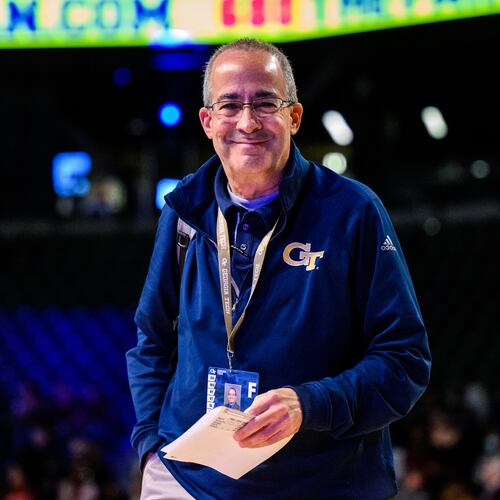Against Notre Dame in October, Georgia Tech wide receiver Malachi Carter finished the game without any catches, one of three games last season when he was held without a reception.
That doesn’t mean he wasn’t getting open, though. He was in the clear 20 yards downfield on a first-and-10 play in the third quarter, but he and quarterback Jeff Sims had an apparent miscommunication, and the pass was long. In the fourth quarter, Carter got a step on a Notre Dame cornerback with a double-move despite being given a seven-yard cushion at the snap. Under pressure, Sims threw just long, missing what might have been a 40-yard completion.
Carter had plenty of highlights, such as his three-catch, 89-yard, one-touchdown game against Louisville. But the two missed plays against the Fighting Irish are an indication of what Carter, Sims and the Tech offense left on the table last season as the Yellow Jackets finished 3-7 and ranked 11th in the ACC in passing efficiency. To advance upon their play from 2020, Carter did his part in offseason work and spring practice, making strength and speed gains and developing as a pass catcher.
“I definitely think I’ve stepped up my game, just because I’m focused a lot more on the little things at my position,” Carter said in April during spring practice.
Coming out of spring practice, the rising senior from Mountain View High was positioned to take a leading role in the offense. With the graduation of wide receiver Jalen Camp, a sixth-round draft pick of the Jacksonville Jaguars, Carter is Tech’s leading returner among receivers, with 20 catches for 290 yards and three touchdowns. (Freshman running back Jahmyr Gibbs caught 24 passes for 303 yards and three touchdowns.)
Wide receivers coach Kerry Dixon said that after last season ended, he and Carter watched every play that he was targeted. (While making 20 catches, Carter was targeted 44 times.)
“We just talked about the little things, as far as mechanically what he can do on the outside, just with his body posture and creating separation,” Dixon said. “A lot of those things, we’ve taken head-on this offseason to make sure he can create separation and be that dynamic receiver on the outside.”
Even before spring practice, Carter said he worked with the other receivers to improve at catching passes and running routes. He also developed his speed.
“Coming out here to college and just seeing some guys that were faster than me or just as fast as me, I knew that in order for me to be the dominant player I want to be, I need to take my speed to another level, as well as the little details in my route running,” Carter said. “Just having that speed just puts you over the top.”
Regarding the “little things” that Carter has focused on, it followed coach Geoff Collins’ mandate to heighten attention to detail.
“Attention to detail is huge in our program,” Carter said. “From snap counts and not jumping offsides to knowing your job to knowing your teammate you’ve got to protect by doing what you’ve got to do.”
His dedication earned him a single-digit jersey from Collins. Carter, who previously wore No. 15, requested No. 7. It his mother Priscellia’s favorite number, Carter said, as it is a biblical number of completion (not the football kind). It is not by accident that he and his brothers (Mossiah and Methias) all have seven letters in their names.
It was to be a surprise, and Carter’s mother found out by seeing photos of her son posted to social media in his new number.
“She calls me up just a little bit emotional because she knows why I did it,” Carter said. “So that’s the story behind it – just kind of pay tribute to my family and let them know I’m dedicating this season to them.”
In three seasons, Carter has repeatedly shown the ability to get open with his speed and route running and also the body control and hands to win contested passes or tightrope the sideline to stay inbounds for catches. He also has been a dynamic playmaker after the catch, displaying the will and power to break tackles and the agility to make defenders miss.
With those traits, as well as his 6-foot-3, 200-pound frame, if Carter can make a jump in production – it will require simultaneous improvement from Sims, pass protection and the coordination of the offense – there would seem little reason that he couldn’t be a strong NFL draft candidate next spring.
In the competition for playing time at receiver, Carter will be joined by returnee Adonicas Sanders (17 catches, 223 yards last season). PeJé Harris, Marquez Ezzard, Nate McCollum, Avery Boyd, Ryan King, Kalani Norris and Zach Owens also will compete for snaps as four incoming freshmen – Leo Blackburn, James BlackStrain, Jamal Haynes and Malik Rutherford – arrive. Grad transfer Kyric McGowan was a standout in the spring.
“I feel like me and the receiver (meeting) room, we’ve put our mindset towards doing the little things when no one’s watching,” Carter said.
Carter called the past two seasons with Collins and offensive coordinator Dave Patenaude “building blocks” as players learned the offense.
“And that resulted in a lot of games that we lost,” Carter said. “But I can say the difference between last year and this year, it’s just the confidence we have in our offense to know that when we go out there, we can go score when we want to. Or we can get a first down when we want to. We’ve got a lot of threats at every position on the field that we have on offense.”
About the Author
Keep Reading
The Latest
Featured

